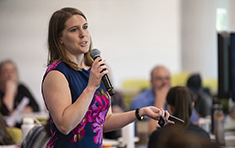Young children in the foster care system demonstrated fewer behavior problems after participating in an innovative seven-week intervention. The program is called PC-CARE, and was pioneered at UC Davis CAARE Center, which provides patient care, teaching, research and prevention initiatives on behalf of abused and neglected children and high-risk youth. These findings were published in Children and Youth Services Review.
 Brandi Hawk
Brandi Hawk
The study presented preliminary findings from the Fostering Secure Placements program, a collaboration between the UC Davis CAARE Center and Sacramento County's Department of Child, Family, and Adult Services (DCFAS). The program offers PC-CARE to foster caregivers of children ages 1-5 in a new foster care placement for 90 days or less in Sacramento County.
"We are honored to work with and make a difference in the lives of these young children in foster care and their caregivers," said Brandi Hawk, lead author of the study and co-developer and supervisor of the PC-CARE program at the UC Davis CAARE Center. "Through our collaboration with DCFAS, we have found that PC-CARE, a program we developed, is associated with improvements in behaviors, relationships, and placement stability for young children in foster care."
The goals of the program were to improve children's adjustment to their new homes and to increase placement stability. It was funded through Substance Abuse and Mental Health Services Administration (SAMHSA) and the National Child Traumatic Stress Network.
PC-CARE is for children ages 1-10 who have or are at risk of developing problems in the caregiver-child relationship. Study participants included 153 children, who participated with their foster caregivers and a PC-CARE provider.
PC-CARE is composed of one assessment and six intervention sessions. The skills taught each week included:
- Session 1: positive communication skills, transitions, creating a compliance-friendly environment
- Session 2: selective attention, redirecting, modeling, calming strategies
- Session 3: rules, choices, when-then/if-then statements
- Session 4: giving effective commands, removal of privileges
- Session 5: redo, hand-over-hand (placing one's hands over a child's hands to help them complete a movement, if appropriate), recovery
- Session 6: collect behavioral measures; review all the skills; including which worked best for the child-caregiver; develop plans for managing future behavior problems
"Although children in foster care are at high risk for developing mental health concerns, this brief program was associated with reductions in those concerns," Hawk said. "Children showed improvements in challenging behaviors, trauma symptoms, self-regulation, adaptive behaviors and caregiver-child relationships. Children who completed PC-CARE experienced fewer placement disruptions at both one and six months after services than children who did not complete services."
These findings suggest that utilizing PC-CARE may help young foster children adjust to new homes and support placement stability for these children.
Co-authors of the study were Susan G. Timmer, Lindsay A.F. Armendariz, Deanna K. Boys and Anthony Urquiza, of UC Davis Children's Hospital.






